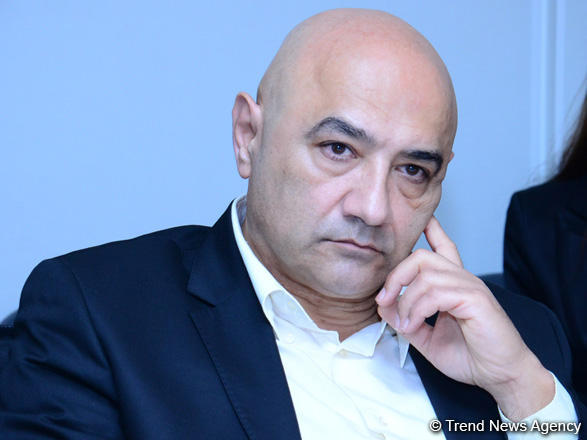Baku, Azerbaijan, April 11
By Matanat Nasibova – Trend:
Issues concerning information security sometimes have a very powerful influence on the minds and moods of social forces, hit it home for national elites, acting in a provocative way, said Azerbaijani political scientist Tofig Abbasov.
He made the remarks during round-table discussions on the topic of “Security problems of the South Caucasus and the countries of the Caspian region” held at the press center of Trend News Agency.
He drew attention to how actively and dynamically the Armenian segment works in Russia.
"It is more mobile because it plays to take the lead, and, in this case, it relies more on destructiveness than on establishing dimensionality. Naturally, everything related to the Karabakh conflict is taken as a basis," Tofig Abbasov said.
The political scientist noted that very dangerous appeals and imperatives were repeatedly voiced in Moscow from high tribunes based on Armenian sources, to the point of stating that Baku must be subjected to rocket attacks.
"Of course, the Azerbaijani expert community and information circles respond to these attacks proportionally. The question is why our colleagues, who know the situation firsthand and are well aware of everything connected with the Karabakh conflict and its geopolitical make-up, are barely dragging their feet. Therefore, I think that we need to work out mechanisms of complementarity, because where we cannot say exactly what needs to be said, our colleagues, rightfully known as our experienced partners, should do that for us in Russian circles, and we expect appropriate actions from them," said Tofig Abbasov.
The event participants discussed Russian-Azerbaijani cooperation in the context of new challenges for the Caspian region, the development of North-South, East-West transport corridor systems as a condition for ensuring security of the Caspian region.
They also discussed signing of the “Constitution of the Caspian Sea” in the context of ensuring regional security in the South Caucasus, regional conflicts and security in the South Caucasus, the fight against terrorism in Azerbaijan, the deepening of economic ties between Azerbaijan and Russia in the light of the formation of a new technology structure in the global economy and economic security, as well as intensification of regional integration and the coordination of the actions of the Eurasian countries in removing tensions and preventing new challenges, the problem of mutual understanding of the North and South Caucasus as a common security system for border states.
From the Azerbaijani side, Azerbaijani MP Rasim Musabayov, head of the Expert Council of the Baku Network, Ph.D. Elkhan Alasgarov, moderator and expert Gulnara Mammadzade, editor-in-chief of the Sputnik-Azerbaijan news agency Ilgar Valizade, professor of Azerbaijan University of Economics Elshad Mammadov, senior adviser of the Baku International Multiculturalism Center Tofiq Abbasov, national security expert, doctor of law Professor Kamil Salimov took part in the meeting.
Stanislav Chernyavsky, director of the Center for Post-Soviet Studies at Moscow State Institute of International Relations, Konstantin Kurylev, director of the Center for Studies of Post-Soviet Countries and Leonid Gusev, senior researcher at the Moscow State Institute of International Relations of the Russian Foreign Ministry participated from the Russian side.






